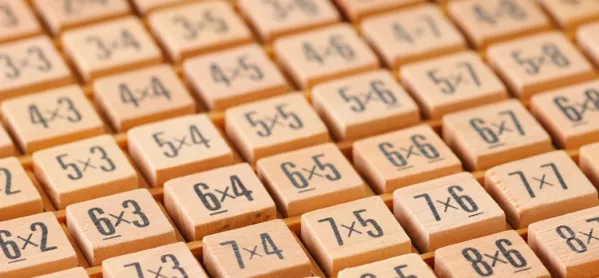The proposed times-tables tests will “cause a lot of anxiety and waste a lot of money”, according to a leading academic and former chief maths adviser.
In an interview with Tes, Dame Celia Hoyles, professor of maths education at the UCL Institute of Education, said she is not happy about the proposals to introduce statutory online times table tests for children at the end of Year 4.
“I’m really worried about them,” she said. “I have yet to see a primary school that doesn’t teach times tables. Everybody knows it’s important. You really need to know your basic facts - that is not the contention - but why do you have to have this timed test?
“I don’t quite get it. It will cause a lot of anxiety and waste a lot of money and time.
“Where is the evidence that this will make a difference? If there is evidence, I’m very happy to read it.”
The times-tables tests are due to be piloted in 2018-19 and introduced in 2019-20.
The government’s response to the primary assessment consultation said the tests “will support all pupils to master their times tables, a crucial foundation for success in more complex mathematics”.
The test is due to be taken online, with an offline option available for schools that lack a suitable internet connection.
Fantastic maths teachers
Dame Celia is a highly-respected expert in mathematics education. She has been awarded dozens of honours, while forging a career in research and guiding national policy, as a chief maths adviser under the Labour government.
Tes asked her about the government’s plans, set out in the recent Budget, to spend millions on improving the standard of maths education.
She said she hoped this would help to close the large variations in maths achievement - most obviously between disadvantaged and advantaged pupils, but also between boys and girls, and between Asian, white and black students.
The announcement of an £8.5 million pot for piloting new methods of teaching children who failed to get a grade 4 (formerly C) at GCSE maths - 156,352 pupils in 2017 - is “brilliant”, she said.
“If they try to do something different using digital technologies, we could set the world on fire,” she added.
She is happy about money going into maths education but is concerned at the rhetoric about our “failing” pupils and teachers.
“I know we could do better,” she said. “But we’re not so bad. I think it is over-egged, how bad we are.
“I think there are some fantastic schools and fantastic maths teachers, and when you get a good community of maths teachers who are really working together here. I don’t think you will get anywhere better.”
This is an edited version of an article in the 8 December edition of Tes. Subscribers can view the full article here. This week’s Tes magazine is available at all good newsagents. To download the digital edition, Android users can click here and iOS users can click here




